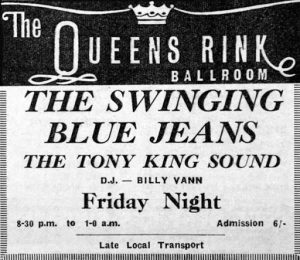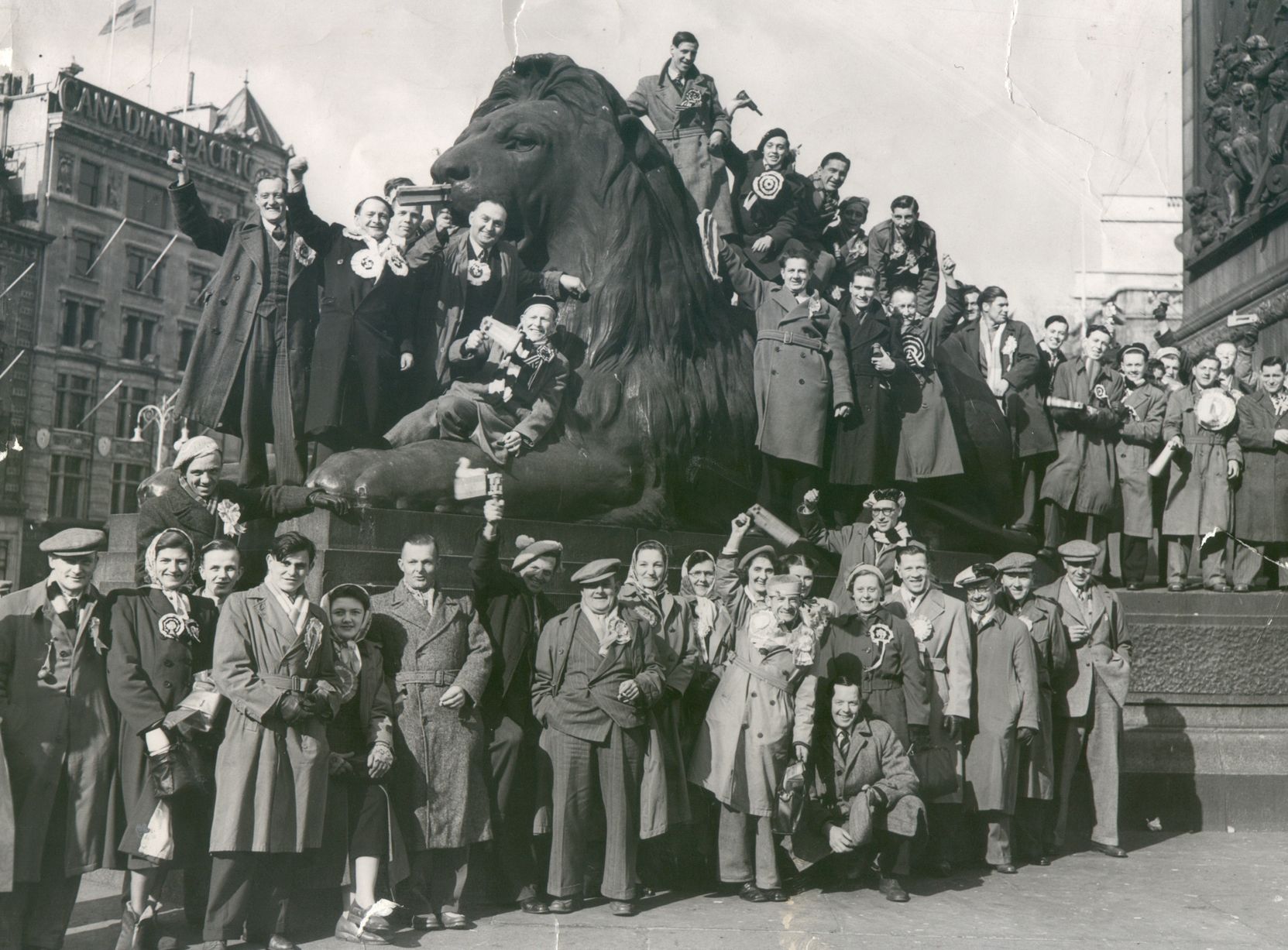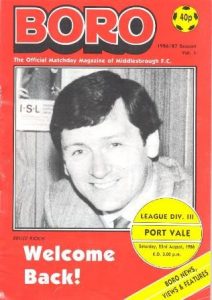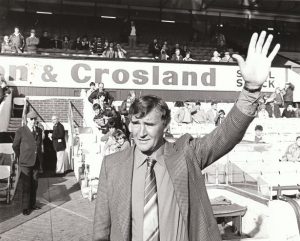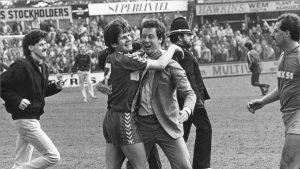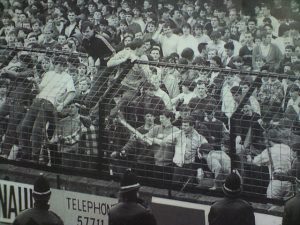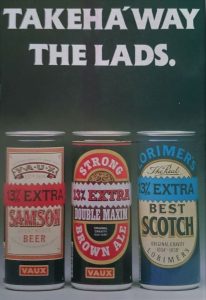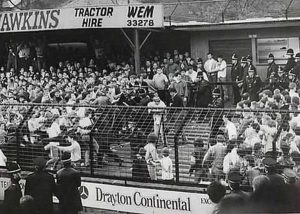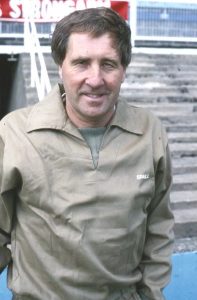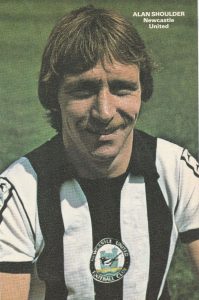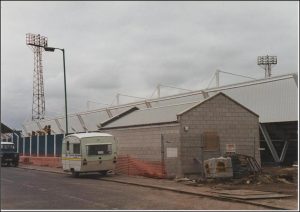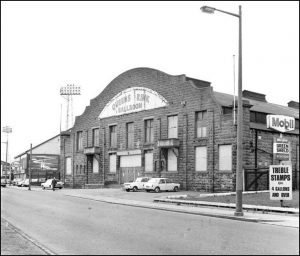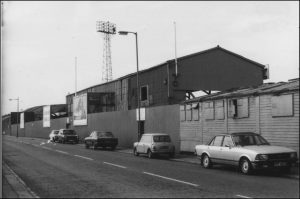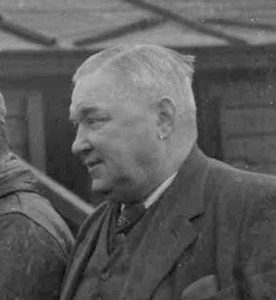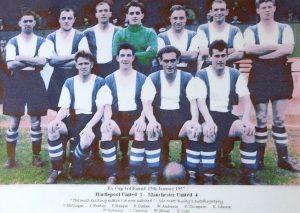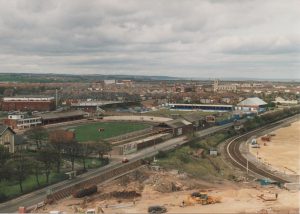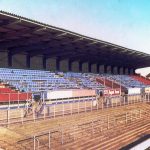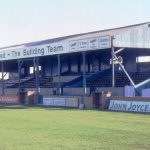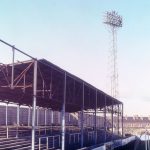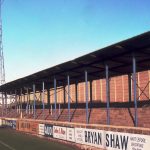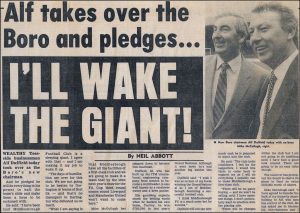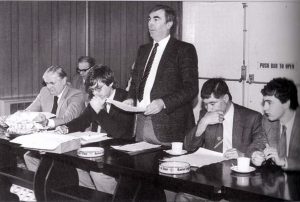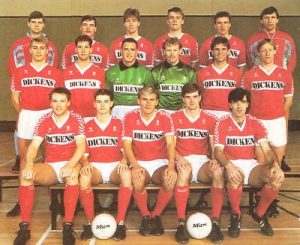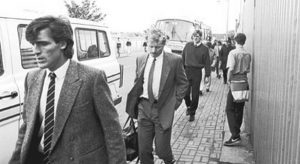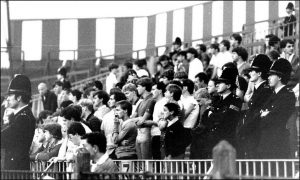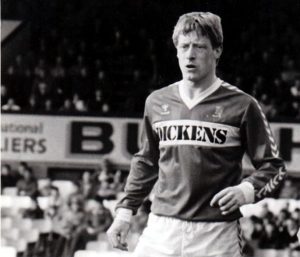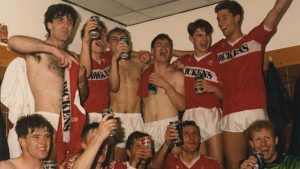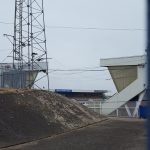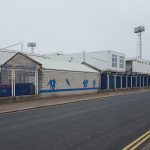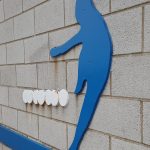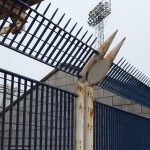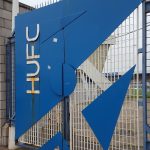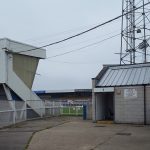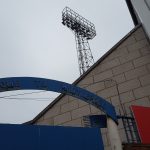Middlesbrough 2 Port Vale 2
League Division 3
23 August 1986
The context
Fifteen miles separate the towns of Hartlepool and Middlesbrough. But until 1986 their football teams had always seemed a long way apart.
Ayresome Park wasn’t a happy place that summer. The reason lay in a prolonged sequence of misfortune and bad management. Opinions vary regarding the point at which the club’s decline truly began – some blame relegation from the First Division in 1982, others trace it further back to the sale of talented players who weren’t adequately replaced. Boro had effectively cashed in an entire midfield during 1981 with Craig Johnston, Mark Proctor and David Armstrong joining Liverpool, Forest and Southampton respectively. Heine Otto was recruited from FC Twente in part replacement and became something of a cult hero, but the fact that he finished as top scorer with a paltry five goals tells its own story of the miserable season that followed.
Neither did these sales balance the books. The annual AGM posted significant losses and there seemed no prospect of recouping them while an average team fumbled around the lower reaches of Division 2. Malcolm Allison was installed as manager but not even his legendary flamboyance could break a vicious circle where the club’s best players were sold and attendances declined year on year. Instead it highlighted a rapid turnover at boardroom level that indicated deep-seated problems. In 1983 Mike McCullagh became the third chairman in eighteen months, and before long he too was replaced – by Alf Duffield, the successful owner of a Teesside engineering firm.
When Allison also decided he’d had enough the team was managed briefly by Jack Charlton before former crowd favourite Willie Maddren took over. Boro sank still further in 1984-85 and needed to win their final game at Shrewsbury to avoid relegation to the Third Division. At the turn of the year, with the side still struggling, Bruce Rioch was brought in as assistant. He and Maddren failed to hit it off and the latter was sacked. Rioch (a former Torquay manager who’d been coaching in North America) achieved just four wins in the last 13 games and the financial pressures grew. Rioch had a terrible argument with Duffield – who had been keeping the club afloat with his own money – and the chairman quit. In April the club were forced to ask the PFA for a loan to pay players’ wages.
The season’s last fixture was once more at Shrewsbury. Middlesbrough were in turmoil on and off the pitch with a number of senior players dropped after objecting to Rioch’s disciplinarian style. An inexperienced team went into the game needing to win and hope Carlisle and Blackburn didn’t, but there was no repeat of the previous year’s escape and Boro lost 2-1 (Blackburn’s result meant they would have gone down anyway). The travelling support was in a sullen temper and their mood became poisonous with the sending off of young defender Gary Pallister. Marauding fans ransacked a tea bar following Shrewsbury’s opening goal and things soon unravelled completely as nervous Shropshire police lost control of the simmering away end.
Here are the memories of some who were there. The quotes in this article are reproduced with thanks to fmttmboro.com .
“After last orders on the Friday night we all piled into a Transit van and headed down there. The van was full of booze. On the outskirts of Shrewsbury we were stopped by police at a road check. When they opened the back door we all fell out onto the road, together with empty whisky and Double Maxim bottles.”
“Travelled down with ten others in the back of a Transit van. Went to Blackpool for a night out after the game.”
“I remember the Seven Stars pub beforehand. Bet they wished they’d got the memo not to open like most of the other pubs had.”
“A terrible day all round. Started with the tea hut in the Boro end getting trashed and ended up with riot police being called in.”
“1986 at Shrewsbury was the lowest point for our team and the behaviour of our fans. Not a day to be proud of.”
“As low as I have ever been at a football match.”
“I was devastated coming out of the ground. My world caved in.”
In contrast Hartlepool were doing rather well. This probably surprised them as much as everyone else. Even judged against traditionally modest standards the previous few years had been particularly tough. One match in 1984 attracted a crowd of just 700 and they’d subsequently been obliged to seek re-election for a record eleventh time. Coming 19th a year later wasn’t much of an improvement. But then manager Billy Horner appointed recently-retired defender John Bird as his assistant and the two worked a minor miracle. Most of 1985-86 was spent in the top four places, with a rare promotion only eluding Pools due to a late run of defeats and a tendency to leak goals away from home.
Horner had been a mainstay of Boro’s defence between 1960 and 1969. He later made more than 200 appearances for Darlington, including a number as player-manager, and was in his second spell at the Victoria Ground following a brief absence in 1983. His decade in charge had produced four re-election applications and a single top half finish. The team’s success the previous year was due in no small measure to the efforts of Alan Shoulder, a 32-year old ex-Newcastle and Carlisle target man who starred in Blyth Spartans’ famous giant-killing side of 1978. Shoulder’s nineteen goals made him Pools’ highest scorer since 1971. A slightly more reliable defence would have seen them start 1986-87 in the same division as Middlesbrough.
The Victoria Ground
Pools’ home (rebranded as Victoria Park to emphasise its new-found smartness) is essentially a 1990s construct. It has a uniformly tidy appearance varied only by some unexpected sculptural steelwork on the Clarence Road frontage, like a kind of galvanised Britart with footballs. The stand here commemorates much-respected former manager Cyril Knowles. Modern club offices occupy a building that for many years did service as the Clock Garage. There’s a tidy terrace at the Town End and a sleek cantilever on the Mill House touchline which manages to appear far more modern than it actually is. The comparatively recent Rink End, meanwhile, is so dingy and pillared that it looks older than all the rest put together.
The rink in question was the Queen’s Rink. This stood at the ground’s northern end and was built in 1910 as a roller-skating arena (roller-skating apparently being a popular pastime in Edwardian Hartlepool). The Rink later became a dance hall and remained a busy nightspot until its 1968 closure. During the Sixties the likes of Lulu, Jeff Beck, Rod Stewart and Johnny Kidd played here. Young couples wanting privacy would end up in the Vic’s conveniently-placed Main Stand, leading Pools’ witty manager Fred Westgarth to quip “A policeman called me on Friday night. He’d caught a dozen courting couples in the stand and asked me what to do with them. I told him to fix the bloody fence and board ‘em in. Best gate of the season it would have been.”
The stand was a temporary structure that remained in place for seven decades before it was finally demolished after the Bradford fire. Spectators entered via a narrow passage behind a wooden fence on Clarence Road, unkindly described by Simon Inglis as “resembling a timber yard”. A flimsy roof was supported by telegraph posts that swayed alarmingly when high winds blew in from the nearby North Sea. The stand had been built following a 1916 Zeppelin raid that ended with two bombs falling on its predecessor. This act of aggression led the club to enter into protracted if one-sided correspondence with the German government following the War. No compensation was forthcoming.
Westgarth was older than both stands. He joined Pools in 1943 and was previously a respected coach at Stockport, Carlisle and Bradford City. His personality was of the larger-than-life kind. Although he once famously told Fulham chairman Tommy Trinder that there were too many comedians in football, this view didn’t stop him being one of them. By 1957 he was in his seventieth year. The team had progressed in the FA Cup by virtue of wins against the amateurs of Selby Town and Blyth Spartans, but when Manchester United arrived in the Third Round Fred was in Hartlepool General with what sadly proved to be a terminal illness. Trainer Ned Westgarth, his son, was looking after the team.
This United game is remembered for the unexpected way in which a workmanlike Division 3 (North) side stretched Matt Busby’s famous Babes to their absolute limit. Fred Westgarth received bulletins in his hospital bed as the visitors ran up an early 3-0 lead through Billy Whelan, Johnny Berry and Tommy Taylor, only to see Pools fight back with goals from three players who would rack up more than a thousand club appearances between them – Frankie Stamper, Kenny Johnson and Jackie Newton. But in the event Whelan scored a late winner to thwart what at times had seemed a likely giantkilling. Busby famously described the match in his autobiography as the most exciting he had ever watched.
Many of the crowd – officially recorded as 17,264 – got in over the rickety fence between the Town End and the adjacent greyhound stadium, a method of entry popular with generations of Poolie youth. “Via the dog track was my favourite”, says one reprobate on pooliebunker.co.uk . “The choices were to brave the glass on the Mill House side or the police at the Rink End, or to climb into the dogs and then over.” The track formed part of the grandly-titled Hartlepool Stadium. This was a multi-purpose venue that predated the Vic and had originally been used for cricket and later by the town’s rugby team. Greyhound racing began during the 1930s and at its peak the stadium boasted a restaurant, 35 kennels and seven on-site bookies. In later years a stock car circuit was built inside the greyhound track. “I went once with some lads from Central Estate”, remembers a petrolhead from nearby Sunderland. “They nicked in then ransacked the cafe. When a car won you could sit on the bonnet for a lap of honour. All four of us burnt our arses.”
- Mill House
- Main
- Town End
- Rink End
(All pictures by Bob Lilliman)
The track was still going strong in 1986. By this time, however, the football ground had changed a lot and not entirely for the better. There were decent floodlights and the Mill House stand was modern and serviceable – both these dated from Brian Clough’s successful eighteen-month spell in charge between 1965 and 1967, an exciting era that culminated in promotion to the Third Division under Angus McLean. But the rest of the Vic appeared on its last legs. All that remained of the main stand was a line of sawn-off telegraph poles and the famous wooden fence. Players changed in portable buildings and both terraced ends had lost their lean-to covers. Finally, after six decades as Hartlepools, the team were now Hartlepool. The “s” had been dropped, along with “United”, due to a 1968 amalgamation of the boroughs of Hartlepool and West Hartlepool (the suffix was much-missed and soon reinstated).
And so back to Boro. Duffield’s successor as chairman was Steve Gibson, the owner of local shipping company Bulkhaul. He’d been a director since November 1984 and was only now beginning to appreciate the extent of the club’s debts. Some went back a decade and all were accruing interest. By May 1986 they totalled £2m. Liquidators were appointed and the Inland Revenue secured a winding up order. At the start of August Rioch was sacked, along with his assistant Colin Todd and the remainder of the club’s non-playing staff, and liquidators padlocked the gates to Ayresome Park. But a hardcore of mostly Middlesbrough-born players elected to remain and carry on training under Rioch and Todd on local parks pitches.
Gibson set about putting together a consortium to buy the club. He recruited the local council, ICI, Scottish & Newcastle Breweries and secretive envelope magnate Henry Moszkowicz. They persuaded Duffield to wind up the existing company but the Football League were uncharacteristically reluctant to support the move. A tense meeting followed on 22 August and the new club was ultimately registered only ten minutes before the League’s deadline. One complication, however, remained. Middlesbrough needed to fulfil their first fixture just 24 hours later, a home game against Port Vale, and with Ayresome unlicenced and barricaded they needed somewhere to do it. This was the point at which Pools came to the rescue. They were at home to Cardiff that Saturday but offered Boro the use of their ground afterwards.
The game
Although Middlesbrough and Port Vale were both new to the Third Division they’d entered from different directions. For the first hour it showed. Although Boro lacked match practice they could still raise a team of young players with experience at a higher level. These pummelled Vale with direct, aggressive football. Striker Archie Stephens scored twice – a towering header from a corner, and a speculative effort from distance – and the game seemed over. But then Boro legs tired and the visitors took charge. Ray Walker and Robbie Earle gained control of the midfield, Earle’s cross set up Richard O’Kelly for a diving header on 69 minutes and just before the end Walker helped on Alan Webb’s pass for Paul Maguire to nip in and rescue a point.
Few supporters imagined the season would end with Boro winning promotion back to Division Two. Neither did they regard it as a priority. The occasion was simply about celebrating survival and acknowledging Pools’ generosity. And by strange coincidence Middlesbrough were back at the Vic within days, as the visitors in the first game of a two-legged League Cup tie. It was the first meeting of the two in a competitive match and with perfect symmetry the second leg marked the team’s return to Ayresome Park. Such a homecoming had seemed impossible a few short weeks before.
All in all that balmy Hartlepool evening felt like a new beginning after the club’s long and difficult decline:
“I was getting married that summer but my real concern was ‘Will the Boro survive?’ A week before the season started the club was still in turmoil. We didn’t feature on the pools coupons till about October.”
“It was just a relief we still existed after seeing the Ayresome gates locked with some security bloke stood there.”
“It was a warm night in Hartlepool – they stuck £1 on admission prices and we had to wait until their match finished before playing a follow up game there.”
“A summer Saturday evening, sunny and mild. It was the second show after Hartlepool v Cardiff on the same pitch.”
“Went to both games at the Vic that day – Pools v Cardiff, then the Boro game. There was a fair bit of trouble at the first game with Cardiff fans in the Pools seats and then in the pubs near the station. Don’t remember any bother involving Boro fans at either the Port Vale or the League Cup game.”
“Boro did have a big group of Joey boys who travelled but Hartlepool wasn’t an issue, we were grateful they let us use their ground.”
“The kickoff time was very unusual and made the game seem even stranger.”
“There was a strange feeling at that game, almost like a friendly.”
“Everyone just seemed happy we were playing. We only had 12 players, who hadn’t played all summer, I thought Port Vale were bankers. Backed them big time in Corals in Stockton, I was in shock when we went 2-0 up.”
“It was a great atmosphere and Boro raced into a two goal lead before all the summer caught up with us and turned the legs to lead.”
“The lasting memory of that night was Archie and his ability to get almost supernatural hang-time.”
“Only home game I missed that season as I didn’t get back from Spain till the Monday after. So I was the only Boro fan in living memory not to be at that game. A shame, the 175,000 packed into the Victoria Ground must have been a sight to behold.”
“Went to the opener at Hartlepool (honest!) Such a relief to see us run out as it really did seem at the start of the summer that we would be out of business.”
“I can be seen as an 11 year old right behind the goal on the highlights.”
“There was never a thought that we would go on to achieve promotion. It was a feeling of relief that the match had gone ahead, it was such a surreal situation. We were down and had almost been out. The fan base had dwindled. But on the pitch things really took off very quickly indeed, against all the odds and a transfer embargo. It was us against the world and that attitude really helped.”
“After three games it was obvious something special had begun.”
“It was a great season all told. At the time I was just happy we had a club, so the fact we did well was a bonus.”
“It was a good time to be a Boro fan. It felt special. We were happy to have a team at all but for them then to play so well was unforgettable.”
Revisited
- ‘Pool view
- bold frontage
- ball ‘Pool
- salt winds
- art attack
- ladies’ room
- eclectic dreams
- meet and greet
- front entrance
- back fence
- cosy corner
- arch support
- goal flash
- brave the glass
- Mill House special
- Rink aware
- Clock face
- undeveloped
- folorn
I stopped off at Victoria Park on an unseasonably grey and chilly August afternoon. A supermarket has obliterated the dog track but the Rink site remains undeveloped and forlorn. Pools have fallen on quiet days since relegation from the League in 2017. The bold 1990s frontage on Clarence Road is faded by salt winds, to the extent that a fan from 1986 would instantly recognise the ground’s ambience if not its structure, and parts of the surrounding area recall Harry Pearson’s description of Hartlepool as “like a scene from Mad Max, only colder.” Yet there is kindness here. Anyone who visited the Corner Flag Bar in happier times will vouch for this, and confirm that – as ever, beneath a tough and uncompromising shell – the spirit of 1986 lives on.
Teams:
Middlesbrough: Pears, Parkinson, Kernaghan, Laws, Cooper, Mowbray, Gill, Hamilton, Ripley, Slaven, Stephens. Sub: Turnbull.
Port Vale: Grew, Webb, Bromage, Walker, Sproson, Williams, Smith, Earle, O’Kelly, Jones, Maguire. Sub: Hunter.
Attendance: 3690
